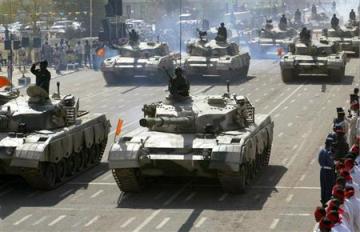Sudan preparing to send army brigade to Yemen at request of Hadi: VP
September 17, 2015 (KHARTOUM) – The Sudanese 1st Vice President Bakri Hassan Saleh confirmed that his government is poised to send ground troops to support forces loyal to Yemeni President Abd-Rabbuh Mansour Hadi in its battle with Houthi rebels and their ally former President Ali Abdullah Saleh.

In an interview with the London-based Asharq al-Awsat newspaper, Saleh said that Sudan did not think twice about joining the Saudi-led Arab military coalition formed last March to reinstate Hadi and flush out Houthi fighters from cities they overran.
“The reality is that what is happening in Yemen is very unfortunate and has exhausted the Yemeni society and posed a threat to the security of the country of the Two Holy Mosques and therefore Sudan had no choice but to announce its actual participation on the ground to protect the people of Yemen and their resources from the futility of the Houthis and outlaw politicians,” the Sudanese VP said.
Saleh said that the security of Sudan and Saudi Arabia is interconnected and as such protecting it “did not require a lot of thinking so we were the first participants in the sorties and our planes arrived there [in Saudi Arabia] early on”.
“Now there are preparations we are working on now at the level of ground forces to send the equivalent of a full brigade to confront the Houthis in Yemen,” he added.
The Sudanese official said that the Yemeni President discussed the military assistance they needed during his recent visit.
“We are currently waiting for the signal to carry out this [deployment],” he added.
Saleh denied that a recent decision by Iran to stop funding of a bridge and a water plant in Khartoum was in retaliation to shutting down their cultural centers and for joining the Saudi alliance in Yemen.
He said that the suspension of funding was related to financial considerations and not political ones stressing that their ties with Tehran are based on mutual interests and not as a means to target other countries.
Observers believe that economic pressures faced by Sudan caused by multiple military conflicts, US sanctions and most importantly the loss of oil due South Sudan’s secession in 2011 prompted the government to reconsider its regional alliances.
Late last year, Sudanese authorities ordered the closure of the Iranian Cultural Centre in the capital Khartoum and other states and asked the Iranian cultural attaché to leave the country in a move seen as a gesture of goodwill towards the Arab Gulf states.
The Iranian government has formally opposed the military operation in Yemen, but did not comment on the Sudanese role or their strategic shift away from Tehran.
But the pro-hardliner Mashregh newspaper in Iran fiercely attacked president Omer Hassan Bashir and described him as an ingrate.
Bashir “found a better meal and traded Iran’s generous help for a seat at Al Saud’s table,” an article on the newspaper said according to Al-Monitor website.
The article stated that given Sudan’s closing of Iran’s offices, maybe Sudan’s support for Saudi’s bombing of Yemen was not unexpected, but “at the same time, everyone who is aware of our country’s support and help of [Bashir] during the most difficult times of his rule, did not expect this level of political immorality and obscenity.”
(ST)
